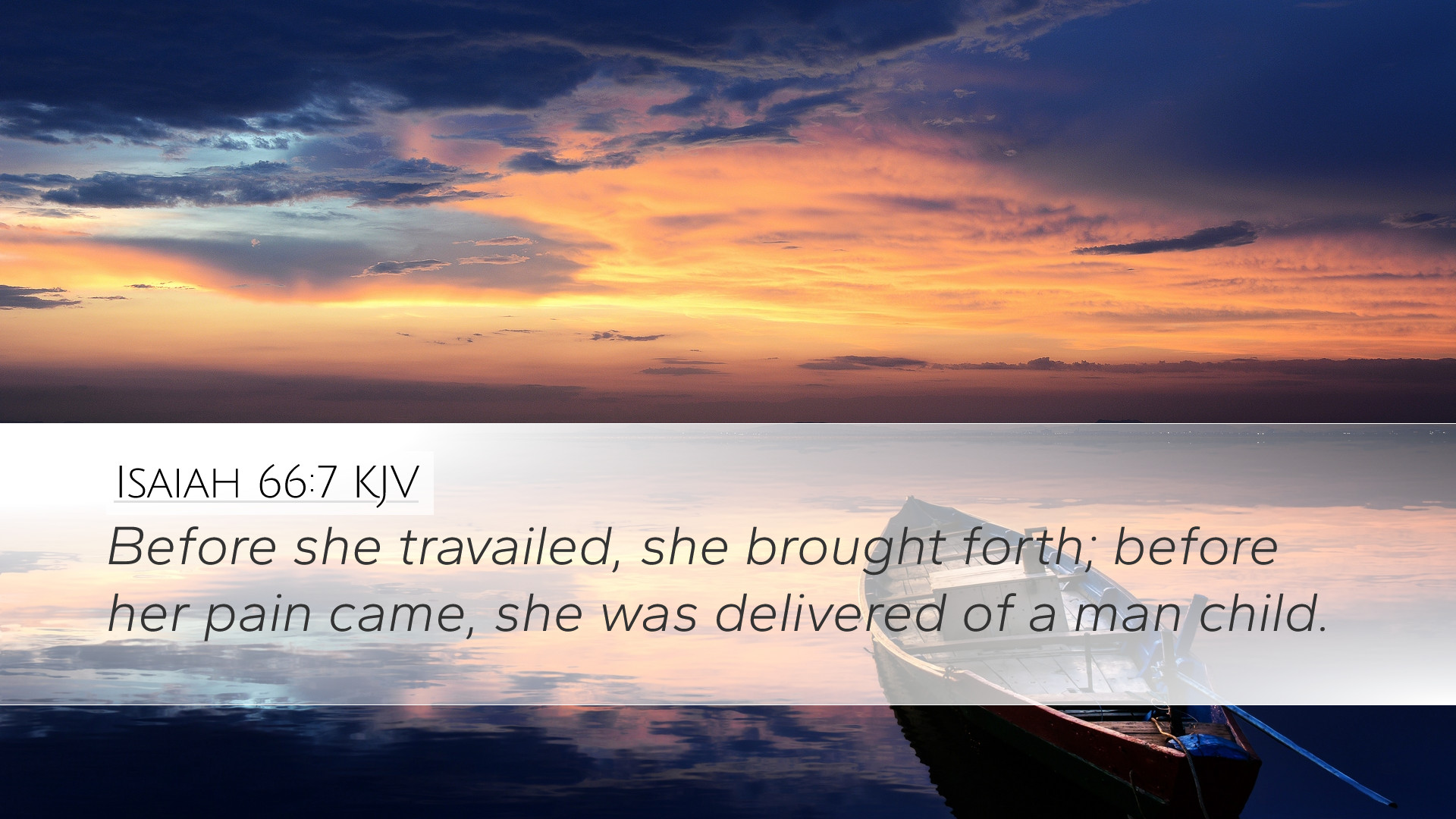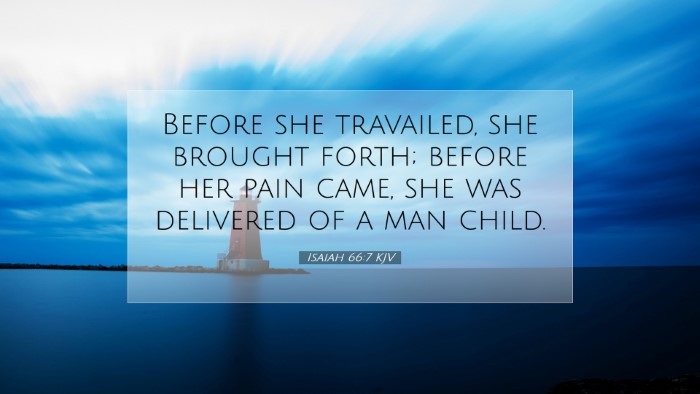Isaiah 66:7 Commentary
Verse: "Before she travailed, she brought forth; before her pains came, she was delivered of a man child." (Isaiah 66:7)
Introduction
This profound verse from Isaiah offers a rich tapestry of insight into God’s sovereignty and the miraculous nature of His dealings with His people. It resonates with themes of unexpected deliverance and emphasizes the divine intervention that overrides natural processes. In this commentary, we will draw from various public domain sources, including the works of Matthew Henry, Albert Barnes, and Adam Clarke, to explore the theological and contextual significance of this passage.
Contextual Analysis
Isaiah 66 serves as a conclusion to the Book of Isaiah, encapsulating the themes of restoration and judgment. The preceding chapters highlight a contrast between the faithfulness of God and the unfaithfulness of Israel. This particular verse stands out as a prophetic declaration regarding the people of Israel, symbolizing a new beginning—a time of birth and restoration that transcends the usual experiences of suffering and travail.
Historical Background
The context of Isaiah's prophecy is crucial for understanding its implications. The Jewish people, having experienced exile and turbulent times, are faced with the promise of a new dawn. The imagery of childbirth serves to illustrate this transformative moment. As Clarke notes, the abruptness of the birth—before travail—suggests the ease of the divine act in contrast to human struggle.
Theological Insights
Understanding the theological implications of this verse is essential for gaining a deeper appreciation of God’s redemptive plan. It speaks of God's ability to bring forth life and hope from seemingly impossible situations.
Divine Sovereignty
Matthew Henry expounds on the concept of divine sovereignty by suggesting that God's ways are often contrary to human expectations. Before the pains of labor, which signify struggle and trial, God brings forth deliverance—a powerful reminder that His ways and thoughts are higher than ours. God orchestrates events according to His purpose, and this verse exemplifies His ability to defy the natural order.
Symbolism of Birth
The act of childbirth in the verse symbolizes new beginnings and hope. Barnes emphasizes that the birth of a child, especially in the ancient world, often represented the continuation of a lineage and the promise of future blessings. The "man child" implies not only survival but also strength and potential, marking a significant promise of God's covenant with His people.
Exegetical Observations
Delving into the Hebrew text can yield additional insights. The word for "travail" (חָבَل, chabal) suggests a process of pain and labor. However, the juxtaposition in this verse dramatically contrasts with the noun for "birth," emphasizing God's capacity to overcome difficulties.
Spiritual Implications
This verse has profound spiritual implications for believers today. It reminds us that God can bring forth His purposes without adhering to the norms of human struggle. This can be particularly encouraging for pastors and leaders who are often amid challenges in ministry.
Hope in Despair
Isaiah 66:7 serves as a beacon of hope amid despair. For congregations experiencing difficulties or leaders feeling overwhelmed, this verse reassures that God can work unexpectedly and miraculously.
Call to Faith
The promise embedded in this verse calls for faith and trust in God’s timing. It encourages both leaders and followers to work diligently, knowing that God is at work even when challenges seem insurmountable.
Practical Applications
For pastors, theologians, and lay leaders, this verse offers several practical applications:
- Emphasis on Prayer: Understanding that God often works in ways we do not expect emphasizes the importance of prayer and seeking divine guidance.
- Encouragement in Ministry: Leaders can find comfort in knowing that growth and revival can occur suddenly, akin to a child being born before the travail.
- Teaching Opportunity: This verse can be used in teaching settings to illustrate God's faithfulness and the hope of resurrection in personal and communal life.
Conclusion
Isaiah 66:7 encapsulates an essential theological truth about the nature of God's intervention in human affairs. Through both historical and contemporary lenses, this verse serves as a reminder of God’s power to bring forth life where there appears to be only death. The insights from public domain commentaries enrich our understanding and encourage us to foster faith amidst challenges. In the complexities of ministry and life, may we hold fast to the promise that God can do immeasurably more than we ask or imagine.


